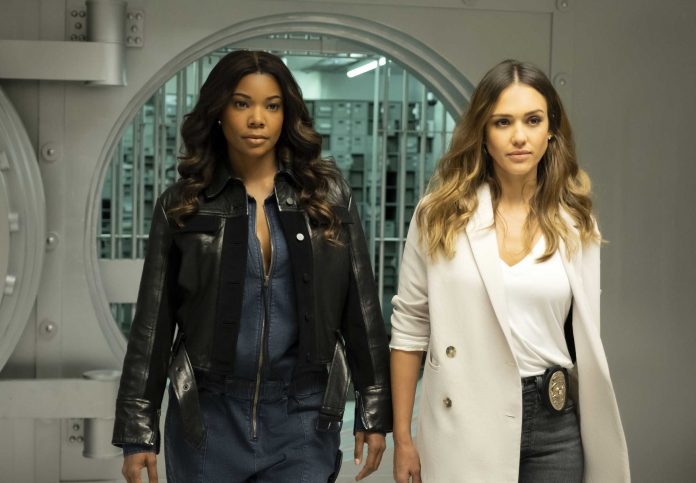
The first new TV season of the coronavirus era is facing an understandably shaky start that comes with a tacit disclaimer: No one is sure when it will arrive.
Studios, guilds and trade groups are huddling to find ways to ease a near-complete production shutdown, among the nationwide efforts to curb the pandemic. While streaming services parcel out series year-round, broadcast TV still relies heavily on a September filled with fanfare and high-profile scripted shows.
How that will happen is a cliffhanger only a masochistic screenwriter would envision.
ABC, CBS and NBC are holding back their 2020-21 schedules which, in an ordinary year, would have been unveiled earlier this month in elaborate presentations to ad buyers in New York. Another broadcaster, CW, said it’s aiming for a January start to its new season, based on production resuming this fall.
CW’s chairman and CEO, Mark Pedowitz, was asked if even that was realistic. “As realistic as anything else is at this point,” he said.
Gabrielle Union, who with Jessica Alba stars in and produces Spectrum cable’s “L.A.’s Finest,” is among those awaiting guidance on how actors and crews can safely return to work. The police drama combines shoot-’em-up action with more intimate scenes, both tests of how social distancing and story demands will co-exist.
“When we all are given the green light to go back, we just have to be flexible and open to this new normal, whatever that’s going to look like,” Union said.
Just four months before the Sept. 20 Emmy Awards kick off the TV season’s traditional start, the uncertainties swirling around COVID-19 are daunting. Even streaming services like well-stocked Netflix or premium cable channels like HBO with fully produced new series in hand must keep a wary eye on a prolonged disruption.
Neal Baer, a physician and a veteran TV writer and producer (“ER,” “Designated Survivor”), had a succinct reply when asked if he would start a production given the unanswered questions about the disease, including whether coronavirus antibodies confer immunity.
“No way,” Baer said. “I’m not going to put people potentially in harm’s way” given the unknowns.
While the Alliance of Motion Picture and Television Producers spearheads the broad industry effort to work with health and government officials on safety protocols, there are also what one executive called impromptu “think tanks” to find solutions.
“Some have attorneys and doctors involved. I do a weekly panel that a cinematographer put together, and we keep adding people who run production companies, sound stages,” said Matt Birch, co-head of physical production for the multinational talent agency APA.
Visual effects supervisors and producers are in high demand, Birch said, to create what can’t be filmed. Among the steps industry members say are being mulled: scenes shot with fewer actors and crew, shortened production schedules and more animated projects.
A critical issue is the insurance that covers losses due to production delays or budget overruns, said Carolyn Hunt, a veteran entertainment lawyer in Los Angeles who handles film and TV financing deals. She said virtually all policies are excluding coverage of COVID-19-related issues.
“That makes things very tricky, so a lot of people are waiting to see what happens there,” Hunt said.
Meanwhile, networks are cobbling together schedules and, in true Hollywood fashion, hoping for a happy ending.
When Fox announced its fall schedule, it included a recycled season-one run of “L.A.’s Finest,” along with two series that the network originally intended to debut this spring, “Filthy Rich” starring Kim Cattrall and tech thriller “neXt” with John Slattery.
The reason the trio of series earned a coveted spot on a network’s fall schedule: They were in the can and ready to air. The same holds true for CW’s fall placeholder shows, including “Swamp Thing,” canceled after one season on streaming and now getting a pandemic afterlife.
Movie and TV mogul Tyler Perry may be showing the way forward. His studio in Georgia, one of the first states to relax virus-related constraints, will resume production in July with two series for BET. Protective measures are to include testing and isolation on the Atlanta lot for cast and crew.
There are other options, if even further afield from the LA and NY production hubs. Iceland plans to ease its travel restrictions in mid-June and is readying filming guidelines, said producer Leifur Dagfinnsson, whose credits include “Star Wars” films and TV’s “Sense8” and “His Dark Materials.” He touts the country’s dramatic landscapes, the London studios that are a three-hour flight from Reykjavík — and Iceland’s emphasis on coronavirus testing.
There are also alternatives to traditionally produced series. CBS aired a socially-distanced episode of its drama “All Rise” made using digital technology, and late-night hosts are drawing kudos for their homemade, YouTube-like episodes that boast family as supporting players.
That’s not the future envisioned by Laura Kennedy, CEO of Avalon, a U.K. and U.S.-based management and TV production company whose shows include HBO’s “Last Week Tonight with John Oliver” and the FX comedy “Breeders.”
“It really is an industry that begs team effort and personal reaction, including writers’ rooms where people riff off each other,” Kennedy said.
A secure return to work is something exciting to look forward to, said “This Is Us” star Mandy Moore. She and others in the NBC drama’s cast reconnected with a Zoom call recently as they await word on when season-five production will begin.
“It’s the opportunity of all our lifetimes to be a part of this show and to do work we’re all so proud of, but we also understand there are bigger issues in the world,” Moore said.



















